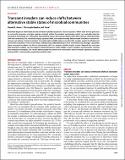Transient invaders can induce shifts between alternative stable states of microbial communities
Author(s)
Amor, Daniel R.; Ratzke, Christoph; Gore, Jeff
DownloadPublished version (828.8Kb)
Publisher with Creative Commons License
Publisher with Creative Commons License
Creative Commons Attribution
Terms of use
Metadata
Show full item recordAbstract
Microbial dispersal often leads to the arrival of outsider organisms into ecosystems. When their arrival gives rise to successful invasions, outsider species establish within the resident community, which can markedly alter the ecosystem. Seemingly less influential, the potential impact of unsuccessful invaders that interact only transiently with the community has remained largely ignored. Here, we experimentally demonstrate that these transient invasions can induce a lasting transition to an alternative stable state, even when the invader species itself does not survive the transition. First, we develop a mechanistic understanding of how environmental changes caused by these transient invaders can drive a community shift in a simple, bistable model system. Beyond this, we show that transient invaders can also induce switches between stable states in more complex communities isolated from natural soil samples. Our results demonstrate that short-term interactions with an invader species can induce lasting shifts in community composition and function.
Date issued
2020-02Department
Massachusetts Institute of Technology. Department of Physics; Massachusetts Institute of Technology. Department of Biology; MIT Materials Research LaboratoryJournal
Science Advances
Publisher
American Association for the Advancement of Science (AAAS)
Citation
Amor, Daniel R., Christoph Ratzke and Jeff Gore. “Transient invaders can induce shifts between alternative stable states of microbial communities.” Science Advances, 6, 8 (February 2020): eaay8676 © 2020 The Author(s)
Version: Final published version
ISSN
2375-2548